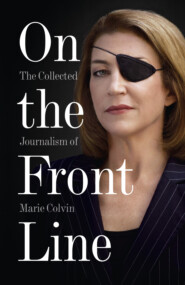
Полная версия:
On the Front Line: The Collected Journalism of Marie Colvin

On the
Front Line
The Collected Journalism
of Marie Colvin

Epigraph
Simply: there’s no way to cover war properly without risk. Covering a war means going into places torn by chaos, destruction, death and pain, and trying to bear witness to that. I care about the experience of those most directly affected by war, those asked to fight and those who are just trying to survive.
Going to these places, finding out what is happening, is the only way to get at the truth. Despite all the videos you see on television, what’s on the ground has remained remarkably the same for the past 100 years. Craters. Burnt houses. Women weeping for sons and daughters. Suffering. In my profession, there is no chance of unemployment. The real difficulty is having enough faith in humanity to believe that someone will care.
MARIE COLVIN
The Sunday Times, 21 October 2001,
‘Bravery is not being afraid to be afraid’
The Marie Colvin Memorial Fund
A portion of the proceeds from the sale of this book goes to the Marie Colvin Memorial Fund
The Colvin family has established a memorial fund in honour of Marie. The fund will direct donations to charitable and educational organisations that reflect Marie’s lifelong dedication to humanitarian aid, human rights, journalism and education.
We thank you for sharing this information with others who may be interested.
Donations may be made payable to:
The Marie Colvin Fund at LICF
1864 Muttontown Road
Syosset, N.Y. 11791
More information on the Marie Colvin Memorial Fund,
and online payment options are available at:
www.mariecolvin.org
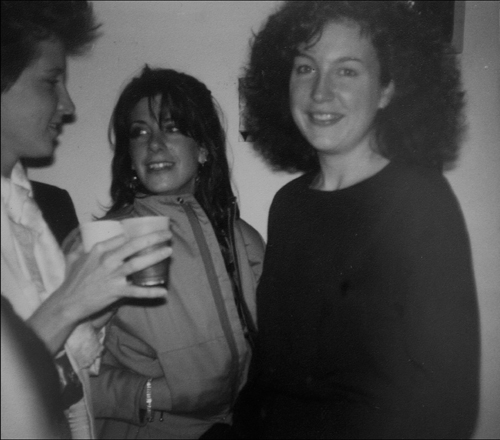
Marie at a university party during her time at Yale, New Haven, CT.
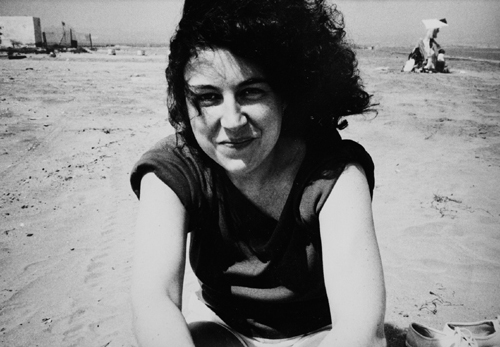
Marie on the beach, Cyprus, 1987.
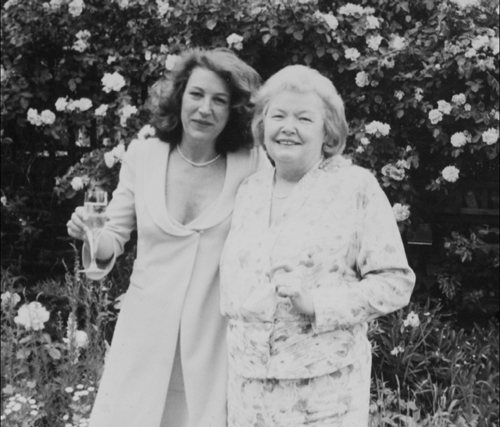
Marie with her mother Rosemarie Colvin, at her wedding to Juan Carlos Gumucio in London.
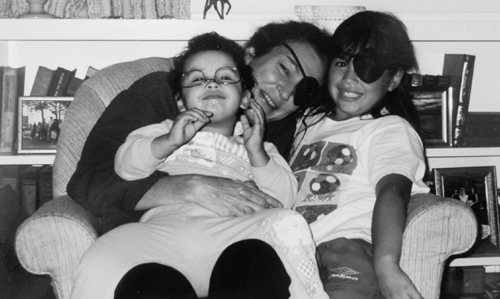
Marie with nieces Michelle Colvin, right, and Justine Colvin, Oyster Bay, 2004.
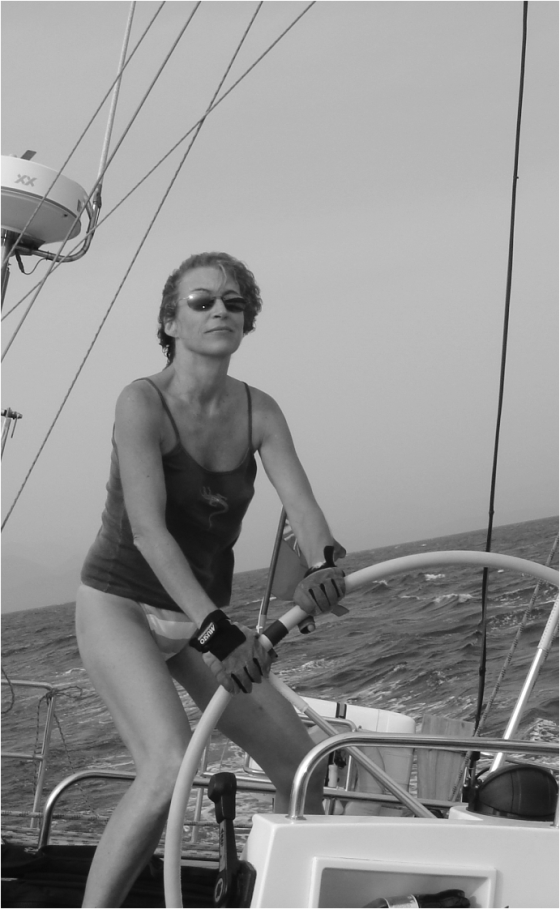
Marie sailing near Zakynthos, 2007. Photograph by Richard Flaye.
Contents
Title Page
Epigraph
The Marie Colvin Memorial Fund
FOREWORD
by Cat Colvin
PART ONE
IRAN–IRAQ WAR
Basra – blitzed and battered, but not beaten – 25 January 1987
Black banners of death fly over Baghdad – 25 January 1987
Wine and lipstick lay Iran’s ghost to rest – 29 October 1989
MIDDLE EAST
Soviet settlers jolted by the promised land – 11 February 1990
Love sours for Romeo and Juliet of the West Bank – 1 April 1990
Desperately seeking answers in the Arafat slipstream – 5 June 1990
Home alone in Palestine – 19 September 1993
Arafat thrives amid cut and thrust of peace – 9 January 1994
LIBYA 1992–93
Frightened Libyans await the next blow – 19 April 1992
Adie’s minder cracks up – 26 April 1992
Lockerbie drama turns to farce – 3 October 1993
GULF WAR
Under fire – 27 January 1991
Ghosts of war stalk Basra’s empty streets – 23 August 1992
Critics are silenced as Saddam rebuilds Iraq – 4 October 1992
Shadow of evil – 22 January 1995
Blood feud at the heart of darkness – 8 September 1996
MIDDLE EAST
The Hawk who downed a dove – 12 November 1995
Israel’s peace hopes wither – 2 June 1996
Israeli bulldozers rev up for showdown in Jerusalem – 16 March 1997
Arafat encircled in battle for Jerusalem – 6 April 1997
KOSOVO
The centuries of conflict over a sacred heartland – 8 March 1998
Kosovo’s silent houses of the dead – 15 March 1998
Kosovo guerrillas fight Serb shells with bullets – 25 April 1999
Massacre in a spring meadow – 2 May 1999
Letter from … Kosare – 4 June 1999
The neighbour who burned with hate – 20 June 1999
British detectives on trail of men behind massacres – 27 June 1999
The enemy within – 15 August 1999
CHECHNYA
Wrath of Moscow leaves no place for Chechens to hide – 19 December 1999
Escape from Chechnya to a trial by ice – 2 January 2000
EAST TIMOR
Trapped by the terror squads in city of death – 12 September 1999
Courage knows no gender – 10 October 1999
PART TWO
ETHIOPIA
Horror of Ethiopia’s living dead – 9 April 2000
ZIMBABWE
Rape is new weapon of Mugabe’s terror – 28 May 2000
Hunzvi’s surgery is turned into a torture centre – 14 May 2000
SIERRA LEONE
Drug-crazed warriors of the jungle – 3 September 2000
How the hi-tech army fell back on law of the jungle and won – 17 September 2000
SRI LANKA
Fighting Tigers talk of peace deal – 15 April 2001
‘The shot hit me. Blood poured from my eye – I felt a profound sadness that I was going to die’ – 22 April 2001
Fighting back – 15 July 2001
Bravery is not being afraid to be afraid – 21 October 2001
MIDDLE EAST
A bitter taste for vengeance – 7 April 2002
Jenin: the bloody truth – 21 April 2002
Two terrible deaths tell story of the Palestinian predicament – 21 July 2002
GUANTANAMO
Mindless torture? No, smart thinking – 27 January 2002
IRAQ
One call from the great dictator and another day of designer torture began in prison – 4 August 2002
Why the great dictator thinks he can still win – 2 March 2003
Hunt for Saddam & Son, the murderous duo most wanted – 23 March 2003
Target Saddam – 21 December 2003
Iraq – 7 March 2004
Face to face with death in a ‘pacified’ Iraqi town – 29 October 2006
The butcher of Baghdad awaits his death sentence – 5 November 2006
‘I watched Saddam die’ – 31 December 2006
Sunni sheikhs turn their sights from US forces to Al-Qaeda – 9 September 2007
I felt a new terror on Basra’s streets – 16 December 2007
Saddam’s victims left to suffer as henchmen prosper – 3 February 2008
MIDDLE EAST
Gaza’s mourners plan ‘spectacular’ revenge – 28 March 2004
Into the underworld – 17 July 2005
Bulldozer Sharon wins through, but bigger battles may lie ahead – 21 August 2005
Fear and defiance in the battered city – 16 July 2006
Birth, death and destruction on Lebanon’s road to hell – 30 July 2006
Gaza’s deadly guardians – 30 September 2007
IRAN
Iran split as fun-hungry young spurn rigged poll – 15 February 2004
Despair and fear among the Tehran dancing classes – 26 June 2005
EGYPT
Mubarak lights a democratic flame – 4 September 2005
KOSOVO
How one careless phone call ended Radovan Karadzic’s liberty – 27 July 2008
PART THREE
MIDDLE EAST
Bloodied Gaza set for the endgame – 11 January 2009
Beyond the violence, a solution is on the table – 11 January 2009
Netanyahu stokes fears to take poll lead – 8 February 2009
Israel’s secret war – 15 January 2012
IRAQ
War-weary Iraqi voters catch election fever despite attacks – 6 March 2010
US departure from Iraq opens the door for Al-Qaeda – 22 August 2010
Terror returns to stricken Fallujah – 29 August 2010
Battered Kurds attempt to cling on to city of oil – 5 September 2010
AFGHANISTAN
Corrupt, untrained, underpaid, illiterate – 6 December 2009
Hamid Karzai fails Taliban who gave up arms – 31 January 2010
Swift and bloody – 9 May 2010
Afghans find pride in hunt for Taliban – 4 July 2010
IRAN
Anger at Mahmoud Ahmadinejad’s election – 14 June 2009
Clashes show depth of fury – 21 June 2009
EGYPT
Flames and fighting flood along the Nile – 30 January 2011
Raging mob bays for Mubarak’s head – 30 January 2011
I ran for my life from a crazed, cursing mob – 6 February 2011
Egypt’s bloody road to reform – 6 February 2011
The kids triumph with Facebook and flyers – 13 February 2011
Feral mobs and fanatics rule Terror Square – 27 November 2011
LIBYA
‘I’ll still be running Libya when my foes have retired,’ insists Gadaffi – 6 March 2011
Siege falters as loyalists defect to side of rebel ‘rats’ – 15 May 2011
‘We had our orders: rape all the sisters’ – 22 May 2011
Professor leads adopted sons into battle – 29 May 2011
Mad Dog and me – 28 August 2011
Killing rooms plot bloody retreat of troops loyal to Tyrant Jr – 4 September 2011
Toxic tyrant’s chemical cavern – 11 September 2011
Desert storm flushes Gadaffi from oasis of dictator chic – 25 September 2011
Brutal retribution – 23 October 2011
Libya keeps silence over vampire dictator’s grave – 30 October 2011
SYRIA
‘Bombs fell like rain. You could only pray’ – 5 February 2012
A vet is only hope for Syrian wounded – 19 February 2012
Final dispatch from Homs, the battered city – 19 February 2012
MARIE COLVIN: THE LAST ASSIGNMENT
by Jon Swain – 26 February 2012
‘REPORTS OF MY SURVIVAL MAY BE EXAGGERATED’
by Alan Jenkins
Footnotes
Tributes
Copyright
About the Publisher
FOREWORD
To me, a world without Marie is unimaginable. I am just now beginning to experience this shadow of a place, and for the first time there is no Marie to give me comfort or guide me through. Marie had so many friends and colleagues who loved her so deeply, and countless admirers who were awed by her courage as a journalist. While I mourn together with those who loved her and take enormous pride in Marie’s accomplishments, my tribute is to my big sister and lost soulmate.
I try to force thoughts of her broken body out of my mind with memories of our time together – the wild adventures and late-night talks, her offbeat advice and unique view of the world. Most of all, I try to recapture the love with which she so totally and constantly enveloped me for as long as I can remember. She was my greatest admirer, my unwavering ally, my fiercest defender. To have someone as brilliant and amazing as Marie offer such love, support and admiration to me is a gift I will always treasure and desperately miss.
Marie was always my hero and to her I was perfection. She claimed me as her own when I was just a toddler, and in her eyes, I could do no wrong. She opened a big, beautiful world to me, full of laughter, excitement and adventure. My earliest memories of Marie are the bedtime stories she used to tell me, like ‘postage stamp kisses’ – my favourite. Marie would lie in my bed and tell me about some faraway place, with vivid descriptions of the sprawling cities, dusty back roads, flowering countrysides or lush jungles. She told me of the customs, languages and dress of the people who lived there, and what they like to do for fun. She told elaborate stories of queens and medicine women, and the beautiful clothes they wore. I learned from her how people danced in the streets of Rio at Carnival and ran with the bulls in Spain. She opened a world of adventure to me, and we explored it together. Each night, when the story was over, she would plaster me with postage stamp kisses to send me off to explore some new place in my dreams.
As we got older, Marie included me in her life in ways that were extraordinary, in retrospect. She took me with her everywhere, and dressed me to her (not my mother’s) liking. We sailed all over Long Island as kids, and later in the Chesapeake Bay and the Florida Keys. We went on protest marches and hung out in the park singing to guitar music during her high school years. I tagged along with her to long classroom lectures and wild parties at Yale. She taught me the lyrics to her favourite songs by Joni Mitchell, Bonnie Raitt and Patsy Cline, and often had me sing them for her friends at parties (Marie could never carry a tune). Marie inspired me to explore the world with an open heart and mind, from backpacking through Europe at seventeen (with a luxurious stop in Paris to visit Marie) through the birth of my daughter in Santiago, Chile, nearly twenty years later.
On my last trip to London, my daughter, now 13, was still young enough to appreciate bedtime stories, and I told her that Aunt Marie was the greatest master storyteller of all time. I remembered the beautiful, exciting world she had created for me as a girl, and was thrilled for Justine to share my experience. Not long after Marie went up to Justine’s bedroom, I began to hear loud bangs, crashes and shouts. I went upstairs to find Marie throwing her hands in the air and leaping around the room delivering a full warzone soundtrack for her story, as Justine listened wide-eyed and intent from her bed, resplendent in the gorgeous new pyjamas Aunt Marie had given her. The stories had changed, but in Justine’s eyes I saw the same fascination I had felt as a girl basking in Marie’s attention.
Marie really was the greatest master storyteller of all time, there is no doubt. She could have written novels, poems or plays and enraptured the world with the gift of her written and spoken words. But Marie chose to devote her gift to bringing the attention of the world to the innocent victims of war. Even as her reporting grew so much more dangerous and intense, and the damage to her body and soul became manifest, she never forgot how to capture the imagination of a young girl, and she never stopped believing in the importance of a little girl’s dream. I hope and believe that Marie will continue to inspire young women everywhere, not only as they read about her dedication and talent, but as they dream of the difference just one little girl can make in this world.
Cat Colvin
March 2012
PART ONE
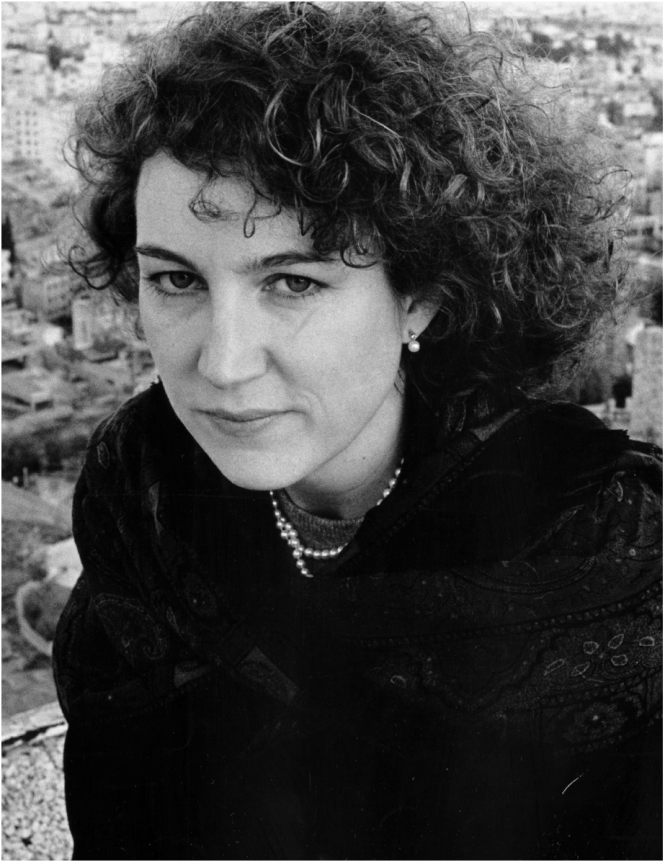
Marie in Amman, Jordan, 1991.
Photograph by Simon Townsley.
Iran–Iraq War

Basra – blitzed and battered, but not beaten
25 January 1987
Marie Colvin sends the first front-line report from inside Basra, Iraq’s besieged city.
In Basra, they say the day belongs to Iraq; the night to Iran. Iraq’s second city is under siege, and Iranian shells slammed into houses for the seventeenth successive day yesterday.
Two missiles hit residential areas on Friday. Long bursts of automatic fire and the sound of close fighting intermittently carry across the Shatt al-Arab waterway that flows past Basra’s corniche to the Gulf.
During the day the Iranian shells fall only about once an hour. But at nightfall the shelling begins in earnest, perhaps because the Iranians are using it to cover troop movements.
The streets remain deserted and only military cars and trucks dare venture out. The shells seem to fall at random throughout the city, crashing into homes, businesses and shops. People here believe that if the Iranians cannot take Basra, they will at least make it uninhabitable.
Although thousands have fled, many remain cowering in homes behind sandbags, piled high to window tops, leaving only cracks to let in daylight and air. Basra has taken on the semblance of a giant military camp, but it has not emptied.
The train I arrived in from Baghdad consisted of 20 coaches filled with soldiers heading to the front. The few women aboard wore the black of mourning.
I took a bus which arrived at 8.30am at Saad Square in the heart of Basra. The shelling began at 8.45am. The few pedestrians on the street started hurrying for cover.
One man stopped and gave me sound advice. ‘It’s not a good idea to walk around Basra when they are shelling,’ he said. ‘You’re very exposed here.’
The Ashrar neighbourhood is one of the heaviest hit in the city. A nearby hotel had its windows blown out and an air conditioner hung from one screw in a window. Branches from trees and masonry littered the streets. On a road leading into the square there was a large crater with a dead horse lying next to it.
In front of the Sheraton Hotel on the Corniche burned-out cars are scattered along the street. All the windows in the building have been shattered and the empty swimming pool is filled with shrapnel from a shell that blew apart a taverna.
While I was there, another shell slammed into the hotel, but did not explode. The building shuddered. An hour later a shell landed nearby on Al-Watani Street, the main street through the city centre which is lined with stores and night clubs which were thriving only three weeks ago.
I took refuge in a basement with a businessman who had been sleeping behind his desk for 16 hours. He gave a depressing view of the city’s chances. ‘I think this is how Germany must have felt in the last days of the Second World War,’ he said. ‘People are just waiting. It’s not that they think the Iranians will take Basra, but maybe they will make it impossible for us to live here.’
The western part of the city has escaped heavy shelling, and there shops are still open and people are on the streets. Even at night soldiers stand outside at corner restaurants eating kebabs.
But everywhere there are tales of tragedy. One soldier was crying as he described how three friends had gone out to telephone home when the bombardment appeared to ease on Wednesday. All three were killed by a shell.
The hospitals are overwhelmed. Members of the Popular Army, the militia that handles logistics for the regular army, make daily rounds asking for blood donations and the sick are being moved out of hospitals to make room for soldiers.
Last week, with doctors exhausted by the influx of wounded soldiers, engineers were called to the hospital to help with amputations.
At about 9 on the evening of my arrival the incoming fire became more frequent. The Iraqis sent up huge pink flares that hung suspended over the Shatt for 10 minutes. It was night time, and night time in Basra belongs to Iran.

Black banners of death fly over Baghdad
25 January 1987
After more than two weeks of fighting, the Iranian offensive which began on 9 January appears to have established a bridgehead of about 40 square miles, according to military analysts here. The Iranian front lines are about six miles east of Basra, writes Marie Colvin in Baghdad.
Iranian troops have infiltrated at night, adding incrementally to their occupied ground. But they have not been able to breach the first main defence line between them and their target of Basra, on the east side of the Shatt al Arab waterway which, farther south, forms the border between the two countries.
Iraq has not launched a counter-offensive on the ground, the only way it could drive the Iranians out of the marshes. Iraqi officials insist this is a deliberate strategy. Iraq’s acting prime minister, Taha Yassin Ramadan, in an interview with The Sunday Times, said: ‘We could easily repulse the Iranians but such an operation would be at the expense of losing the opportunity to kill as many of them as possible. Oddly enough they keep up their influx into this killing zone.’
Both states have about 1 million men under arms. But Iran, with its population of 45m, can afford more casualties. It relies on ‘human waves’ of young volunteers, who have been promised heaven if they are killed, to overwhelm the enemy’s initial defences, before sending in the revolutionary guards.
Iraq, with its smaller population of 14 million, cannot afford the huge casualties such tactics entail.
As the Americans realised in Vietnam, a ground counter-offensive would prove costly in Iraqi lives and would be politically unacceptable at home. So the Iraqis in this battle, as before, have stood back and used their superiority in arms to shell the Iranian positions.
The Iranian show of muscle is potentially frightening because of Ayatollah Khomeini’s vow that he will spread his brand of Shi’ite fundamentalism to the Gulf, beyond Iraq. Kuwait is the next state in line and the sound of the fighting in southern Iraq can be heard late at night in its capital, where the summit will be held. But Iraq goes into the summit holding a strong hand. Other Islamic states are known to resent the fact that Iran has completely ignored Iraq’s peace initiatives. Iran has said it will not end the war until the regime of President Saddam Hussein is ousted, while Iraq would settle for peace and a return to international borders. Iran has also lost its claim to be a pure revolutionary state because of the recent revelations that it bought arms from ‘Great Satan’ America and ‘Little Satan’ Israel.

Wine and lipstick lay Iran’s ghost to rest
29 October 1989
It might have been Manhattan. Guests sipped Scotch or wine and grumbled about the government. The last visitors dined on pot luck from the fridge and took a late-night tour of the wine cellar.
But this was Tehran. The host bought his Scotch on the black market for about 600,000 rials a bottle, or £372. The ‘cellar’ was a backyard shed hiding huge bottles of wine brewed from a Boots kit. Tame peacocks preened on the lawn and someone quietly smoked opium.
Iran has changed under its new president, Hojatolisalam Hashemi Rafsanjani. Most well-to-do Iranians have made their peace with the regime, and the mullahs need their skills. Their lifestyle is tolerated so long as it stays behind the villa walls in wealthy, tree-shaded northern Tehran.
Although women must still cover their heads in public, a new Tehran ‘look’ has replaced the voluminous chador. Trendy women wear stove-pipe jeans and high heels under three-quarter-length black raincoats and cover their heads with flowered scarves. Lipstick and black eyeliner have returned.
The feeling of relaxation can be deceptive. A group of West Germans had to be rescued by their ambassador a few weeks ago after a local revolutionary committee broke up their late-night party. Three other foreigners sentenced to 90 lashes for having affairs with local women had to be spirited out of the country.



